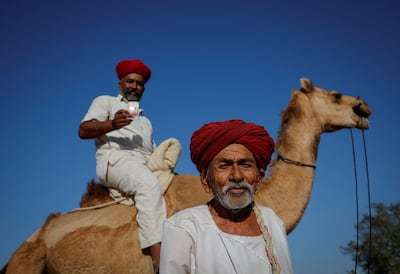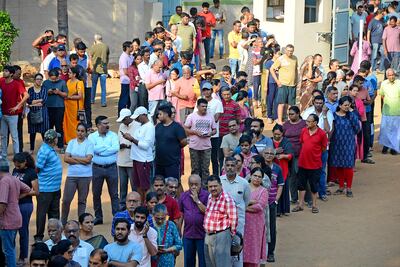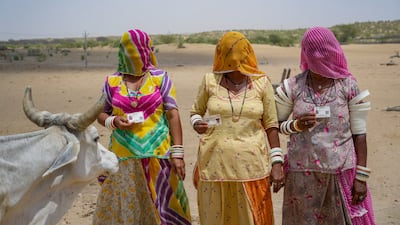At least 60.9 per cent of Indians voted in the second phase of the parliamentary elections in 88 constituencies, after polling concluded in 13 states and union territories in the first two phases, India's Election Commission said on Friday.
The world’s largest democracy is carrying out a seven-phase national election to Lok Sabha, the lower house of parliament, which will end on June 1.
This year’s election is the second-longest in the history of the country. India took four months to complete its first general election in 1951-1952, while the operation took 39 days in 2019.
About 970 million people are eligible to vote.
In the second phase alone, more than 166 million voters were registered to vote across 13 states. There were 167,000 polling booths and 1,202 candidates in the fray.

Voters used electronic voting machines that list the candidates and symbols of their political parties. People cast their ballots by pressing the button next to their preferred candidate's name.
Among the most watched states was Kerala, which has 20 seats.
An alliance led by the Mr Gandhi's Indian National Congress swept elections in the left-ruled state during the 2019 Lok Sabha polls, when it won 19 seats.
Mr Gandhi, leader of India's main opposition Congress party, was tested in the coastal state on Friday, where he is a parliamentarian from Wayanad constituency, a bastion of his grand-old party that has given three prime ministers to India.
He is being seen as the main challenger to Prime Minister Narendra Modi, who is seeking a third term.
Winning the state is crucial for Mr Modi’s ruling Hindu-nationalist Bharatiya Janata Party, which is struggling to make inroads into southern India.
The BJP had failed to win even a single seat in Kerala in the last elections.
Voting was also held in Karnataka, Rajasthan, Maharashtra, Uttar Pradesh, Madhya Pradesh, Assam, Bihar, Chhattisgarh and West Bengal, in strife-torn Manipur, Jammu and Kashmir and Tripura.
There were reports of fake voting and glitches in Electronic Voting Machines in Kerala and West Bengal.
In neighbouring Karnataka state, a case was filed against Tejasvi Surya, the national president of BJP’s youth wing, for seeking votes on the ground of religion.
Mr Surya is known from his strong Hindutva rhetoric and inflammatory speeches against minorities, mainly Muslims.
Some of the prominent candidates in the fray were senior Congress leader Shashi Tharoor, also from Kerala, actor-turned-politicians Hema Malini and Arun Govil.
Mr Govil played the role of Hindu deity Lord Ram in Ramayan, a television show in the 1980s.

The first phase of elections took place on April 19, while the third phase is scheduled on May 7.
The BJP has launched a “Once Again Modi” campaign as the government is focusing on the agenda of Viksit Bharat (Developed India) to make the country a developed nation by 2047.
Congress is fighting the elections on promises of minimum wages, job guarantees, freedom to practise religion, and personal laws for people, particularly from religious minority communities.
Several opinion polls and media commentators are putting his party ahead of its rivals.
Meanwhile, India’s Supreme Court on Friday rejected 100 per cent cross-verification of Electronic Voting Machines EVMs with special voting verifiable machines.
The Voters Verifiable Paper Audit Trail or VVPAT are independent machines connected to some of the EVMs that print a paper slip when a voter casts their votes on the EVM.
It verifies to a voter if their vote was cast as intended for the candidate or the political party.
While the government and the ECI claim that EVMs are largely seen as tamper-proof, critics and opposition leaders often claim that the devices can be rigged.

The ECI randomly verifies the VVPAT slips of EVMs from five polling booths per assembly segment in a parliamentary constituency.
The Association for Democratic Reforms, an independent election watchdog, had filed a petition at the top court seeking 100 per cent verification of the voting machines using the VVPATs.
The petitioners had further sought measures to ensure a return to the previous method of using ballot papers for voting.
But Justice Dipankar Datta and Sanjiv Khanna had rejected all the pleas.
"We have discussed, elaborately, all protocols and technical aspects (and) we reject all pleas. Blindly distrusting a system can lead to unwarranted suspicions," the bench said.


